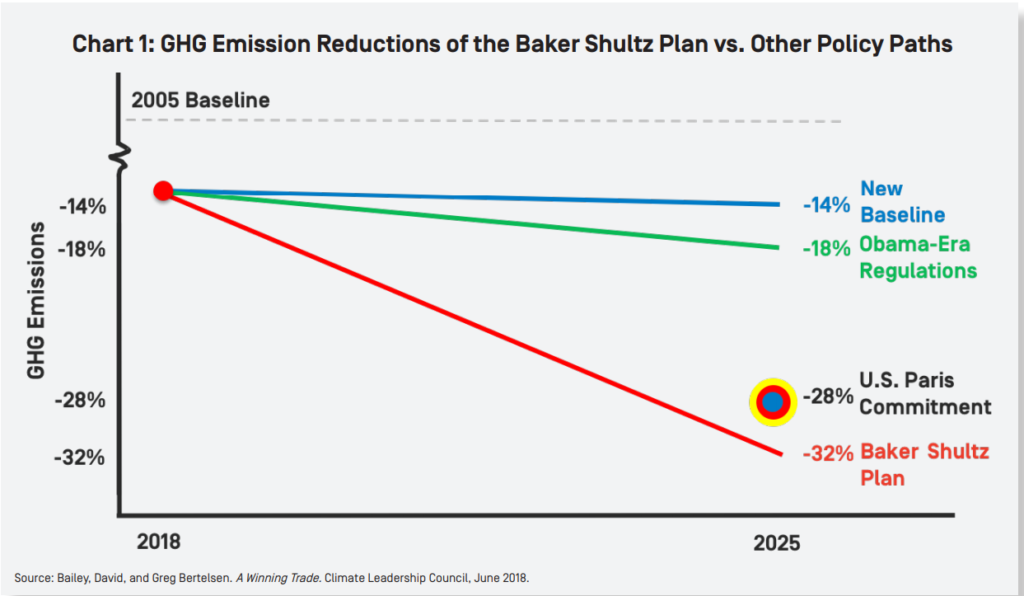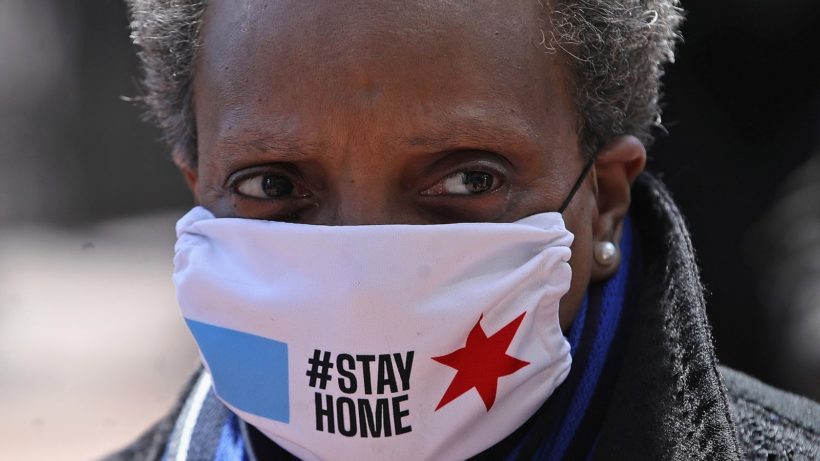 By Matthew Capuano-Rizzo
By Matthew Capuano-Rizzo
Chicago Mayor Lori Lightfoot at Wrigley Field, which has been converted into a temporary food packing and distribution center. –WGN 9 Chicago
The coronavirus has worsened existing social and economic inequalities
Despite our tendency to sing that we’re all in this together, the most vulnerable communities have been disproportionately affected by the coronavirus pandemic and the subsequent economic lockdown. African Americans, for example, make up more than 70% of COVID-19 deaths in Chicago, despite comprising only 30% of the city’s population. Harvard researchers recently linked air pollution to higher coronavirus death rates and communities of color live with 66% more air pollution. In addition to the environmental causes, African Americans are more likely to have chronic health conditions such as heart disease, work in essential fields and have inconsistent access to health care. Native Americans have also been hit hard by the coronavirus. Loss of casino revenue has left First Nations unable to provide basic services. In addition, the reserves’ remote locations are often isolated from medical facilities. The impact of such inequality has been devastating. For example, the Navajo Nation, which includes parts of Arizona, Utah, and New Mexico, has suffered 1,300 COVID-19 cases and 49 deaths, three times the number of cases of Montana or Wyoming. Furthermore, not everyone can simply jump online for school and work. 46% of the world’s population and 19 million Americans (6 percent of the population) are still offline. Lack of access is more acute in communities of color.
While countries such as South Korea and Germany have engaged in mass testing, distributed supplies, and worked with local governments, the US response has flailed from denial to promotion of false cures. In the absence of federal leadership, states have been forced to compete for supplies. Unemployment is skyrocketing as many businesses have been forced to shut down and let go of employees. Despite the assistance in unemployment insurance and stimulus checks provided in recent recovery packages, many Americans are still struggling to cope with the economic strain of the coronavirus shutdown. It does not have to be this way. To open up, public health officials say that the United States needs to have universal coronavirus testing. We need to increase testing from one million tests per week to as many as 20 million per day. Although such an initiative could cost up to $300 billion over two years, the cost of our present economic lockdown is as much as $350 billion per month. When we start to ease restrictions, in June, or maybe later, how should we rebuild our economy?
The climate crisis is still here
Unfortunately, the climate crisis does not disappear just because we have stopped thinking about it. The coronavirus has reminded many of us of the concept of exponential growth, the disease increases at an increasing rate. Climate change operates in a similar way. Its effects compound and worsen over time as greenhouse gas emissions continue to rise. The World Bank warns us that if world temperatures rise by 2 degrees celsius 100 million more people will experience poverty by 2030 and 150 million displacement by 2050. By 2025, the World Health Organization estimates that half of the world’s population will be living in water-stressed areas. Even if countries stick to their current commitments, the IPCC warns that temperatures can be expected to rise 3.2 °C with devastating effects. In the United States, we have already seen many of these effects. The US has experienced more than twice the number of billion-dollar disasters during the 2010s than the 2000s decade. 2019 was the second hottest year on record and climate-related disasters such as record fires in California and record flooding in North Carolina cost the United States economy $45 billion. Those figures represent not only a loss to the economy in its aggregate, but also to people who have lost their homes, farmers who have lost their crops, and children who may have lost their future.
How we respond when faced with a dreadful, but temporary public health crisis can inform how we respond to the more dreadful and longer term threat of the climate crisis. The US Congress has responded in ways previously considered politically impossible such as providing paid-sick leave to workers, increasing unemployment insurance, and providing a “Lite” version of a universal basic income. Such progress has come with corporate bailouts and other concessions, but we cannot deny that this crisis and these packages have questioned the widely-held belief that governments and economies can’t change.
A way forward
A coalition of economists, business leaders, and environmentalists propose a way forward: a carbon fee and dividend. The Climate Leadership Council’s plan, also known as the Baker-Shultz plan, is endorsed by almost all economists, several major corporations, fossil fuel and renewable energy companies, as well as environmental NGOs such as Conservation International and the World Resources Institute. Environmentalists may criticize this plan because it involves working with the enemy: fossil fuel companies. Just 100 fossil fuel companies, including some of the plan’s signatories such as ExxonMobil, Total and BP, are responsible for 71% of global greenhouse gas emissions. Despite its internal scientific consensus going back 60 years, ExxonMobil has sought to sow doubt about the scientific consensus on climate change in order to continue selling its product. Fossil fuel companies also outspend environmental advocates 10:1 in climate lobbying.
This plan, however, could constitute an integral first step in addressing the climate crisis and facilitating a sustainable economic recovery from the coronavirus pandemic. The plan proposes a gradually increasing carbon fee, starting at $40/ton and rising 5% each year above inflation. If implemented in 2021, the plan will cut US CO2 emissions in half by 2035. The Council’s plan also includes an Emissions Assurance Mechanism that would temporarily increase the carbon fee, if emissions reductions are not on track with key benchmarks. Since the carbon fee is revenue-neutral, its proceeds would be returned to the American people, benefiting a family of four, for example, with $2000 in carbon payments per year. This sum would grow as the carbon fee increased over time.

Although such benefits would not be a replacement for unemployment insurance and other social safety net measures, the carbon payments would help Americans pay the increased energy costs a decarbonized economy would entail. Similarly, quarterly carbon dividend payments could help stabilize the lives of the more than 78% of workers who live from paycheck to paycheck and the many who have lost their paychecks from the coronavirus lockdown. Furthermore, the plan would allow businesses to make investments in a low-carbon future because of the certainty of an increasing carbon tax. The border-adjustment aspect of the plan would encourage other countries to increase their environmental standards and prevent carbon leakage. While an improved plan would price greenhouse gas emissions on a carbon equivalent basis, to account for methane emissions from natural gas and agriculture, the Baker-Shultz plan constitutes a way out of the coronavirus crisis into a more sustainable and equitable future.

Bibliography
“2019 Was 2nd Hottest Year on Record for Earth Say NOAA, NASA | National Oceanic and Atmospheric Administration.” Noaa.Gov, 2019, www.noaa.gov/news/2019-was-2nd-hottest-year-on-record-for-earth-say-noaa-nasa.
Baker, James, and George Shultz. “Our Plan.” Climate Leadership Council, Feb. 2020, clcouncil.org/our-plan/#. Accessed 26 Apr. 2020.
BERARDELLI, JEFF. “Satellite Images Reveal Huge Amounts of Methane Leaking from U.S. Oil Fields.” Www.Cbsnews.Com, 4 2020, www.cbsnews.com/news/methane-permian-basin-oil-gas-climate-change/. Accessed 26 Apr. 2020.
Collins, Katie. “We’re Falling Short of the UN’s Goals for Internet Access.” CNET, 16 Apr. 2020, www.cnet.com/news/un-internet-access-goals-wont-be-met-the-way-were-going-research-shows/. Accessed 26 Apr. 2020.
“Eighth Broadband Progress Report.” Federal Communications Commission, 21 Aug. 2012, www.fcc.gov/reports-research/reports/broadband-progress-reports/eighth-broadband-progress-report.
Environment, UN. “10 Things to Know about the Emissions Gap 2019.” UN Environment, 2019, www.unenvironment.org/news-and-stories/story/10-things-know-about-emissions-gap-2019.
Erb, Kelly Phillips. “Frustrated With The Stimulus Check Portal? IRS Says Try Again.” Forbes, 26 Apr. 2020, www.forbes.com/sites/kellyphillipserb/2020/04/26/frustrated-with-the-stimulus-check-portal-irs-says-try-again/#2dd8f5ea5b8f. Accessed 26 Apr. 2020.
Fossil Fuel Interests Have Outspent Environmental Advocates 10:1 on Climate Lobbying. “Fossil Fuel Interests Have Outspent Environmental Advocates 10:1 on Climate Lobbying.” Yale E360, 2018, e360.yale.edu/digest/fossil-fuel-interests-have-outspent-environmental-advocates-101-on-climate-lobbying.
Friedman, Zack. “78% Of Workers Live Paycheck To Paycheck.” Forbes, 11 Jan. 2019, www.forbes.com/sites/zackfriedman/2019/01/11/live-paycheck-to-paycheck-government-shutdown/#553dc3ba4f10. Accessed 26 Apr. 2020.
GARTHWAITE, JOSIE. “The Effects of Climate Change on Water Shortages.” Stanford Earth, 22 Mar. 2019, earth.stanford.edu/news/effects-climate-change-water-shortages#gs.4laznw. Accessed 26 Apr. 2020.
Hill Golden, Sherita. “Coronavirus in African Americans and Other People of Color.” Johns Hopkins Medicine, 20 Apr. 2020, www.hopkinsmedicine.org/health/conditions-and-diseases/coronavirus/covid19-racial-disparities. Accessed 21 Apr. 2020.
“Internet/Broadband Fact Sheet.” Pew Research Center: Internet, Science & Tech, Pew Research Center: Internet, Science & Tech, 12 June 2019, www.pewresearch.org/internet/fact-sheet/internet-broadband/.
King, Amanda. “Linking Air Pollution To Higher Coronavirus Death Rates.” Department of Biostatistics, 13 Apr. 2020, www.hsph.harvard.edu/biostatistics/2020/04/linking-air-pollution-to-higher-coronavirus-death-rates/. Accessed 26 Apr. 2020.
Koeze, Ella. “The $600 Unemployment Booster Shot, State by State.” The New York Times, 23 Apr. 2020, www.nytimes.com/interactive/2020/04/23/business/economy/unemployment-benefits-stimulus-coronavirus.html. Accessed 26 Apr. 2020.
KUNREUTHER, HOWARD, and PAUL SLOVIC. “What the Coronavirus Curve Teaches Us About Climate Change.” POLITICO, 26 Mar. 2020, www.politico.com/news/magazine/2020/03/26/what-the-coronavirus-curve-teaches-us-about-climate-change-148318.
Laughland, Oliver, and Lauren Zanolli. “Why Is Coronavirus Taking Such a Deadly Toll on Black Americans?” The Guardian, 25 Apr. 2020, www.theguardian.com/world/2020/apr/25/coronavirus-racial-disparities-african-americans. Accessed 26 Apr. 2020.
McCurry, Justin. “Test, Trace, Contain: How South Korea Flattened Its Coronavirus Curve.” The Guardian, 23 Apr. 2020, www.theguardian.com/world/2020/apr/23/test-trace-contain-how-south-korea-flattened-its-coronavirus-curve.
“Meet the Human Faces of Climate Migration.” World Bank, 2018, www.worldbank.org/en/news/feature/2018/03/19/meet-the-human-faces-of-climate-migration. Accessed 22 Nov. 2019.
News, Anne C. Mulkern, E&E. “Climate Change Has Doubled Riskiest Fire Days in California.” Scientific American, 3 Apr. 2020, www.scientificamerican.com/article/climate-change-has-doubled-riskiest-fire-days-in-california/. Accessed 26 Apr. 2020.
“OHCHR | UN Expert Condemns Failure to Address Impact of Climate Change on Poverty.” Ohchr.Org, 2019, www.ohchr.org/EN/NewsEvents/Pages/DisplayNews.aspx?NewsID=24735.
“Overview.” World Bank, 2019, www.worldbank.org/en/topic/climatechange/overview.
Post, Ian Livingston, The Washington. “A 125-Year Weather Record Just Broke in The US, But The Floods Will Keep Coming.” ScienceAlert, 11 June 2019, www.sciencealert.com/the-water-just-keeps-coming-as-the-us-continues-its-wettest-12-months-in-125-years. Accessed 26 Apr. 2020.
ProPublica. “How the Coronavirus Bailout Repeats 2008’s Mistakes: Huge Corporate Payoffs With Little Accountability.” ProPublica, ProPublica, 7 Apr. 2020, www.propublica.org/article/how-the-coronavirus-bailout-repeats-2008s-mistakes-huge-corporate-payoffs-with-little-accountability.
Riley, Tess. “Just 100 Companies Responsible for 71% of Global Emissions, Study Says.” The Guardian, The Guardian, 14 Feb. 2018, www.theguardian.com/sustainable-business/2017/jul/10/100-fossil-fuel-companies-investors-responsible-71-global-emissions-cdp-study-climate-change.
“ROADMAP TO PANDEMIC RESILIENCE: Massive Scale Testing, Tracing, and Supported Isolation (TTSI) as the Path to Pandemic Resilience for a Free Society.” The Edmond J. Safra Center for Ethics at Harvard University, Harvard University, 20 Apr. 2020, ethics.harvard.edu/files/center-for-ethics/files/roadmaptopandemicresilience_updated_4.20.20.pdf.
Rosenbaum, Eric. “White House Economic Advisor Kevin Hassett Says Unemployment Rate Will Approach Great Depression.” CNBC, 26 Apr. 2020, www.cnbc.com/2020/04/26/coronavirus-hassett-says-unemployment-will-approach-great-depression.html. Accessed 26 Apr. 2020.
Rust, Susanne. “Report Details How ExxonMobil Sowed Doubt on Climate Change.” Los Angeles Times, Los Angeles Times, 21 Oct. 2019, www.latimes.com/environment/story/2019-10-21/oil-companies-exxon-climate-change-denial-report.
Santucci, Christal Hayes, Nora Mabie and Jeanine. “Native American Tribes Have Been Hit Hard by Coronavirus, and They’re Battling Red Tape to Get Help.” USA TODAY, 24 Apr. 2020, www.usatoday.com/story/news/politics/2020/04/24/coronavirus-indian-country-hit-hard-tribes-battle-red-tape/5130415002/. Accessed 26 Apr. 2020.
Smith, Adam. “2010-2019: A Landmark Decade of U.S. Billion-Dollar Weather and Climate Disasters | NOAA Climate.Gov.” Climate.Gov, 9 Jan. 2020, www.climate.gov/news-features/blogs/beyond-data/2010-2019-landmark-decade-us-billion-dollar-weather-and-climate.
Stenson, Jacqueline. “America Needs Widespread Testing. Here’s How We’ll Get There.” NBC News, 26 Apr. 2020, www.nbcnews.com/health/health-news/america-needs-universal-covid-19-testing-here-s-how-we-n1192146. Accessed 26 Apr. 2020.
“The Federal Government Informs about the Corona Crisis.” Deutschland.De, 24 Apr. 2020, www.deutschland.de/en/news/german-federal-government-informs-about-the-corona-crisis.



Leave a Reply